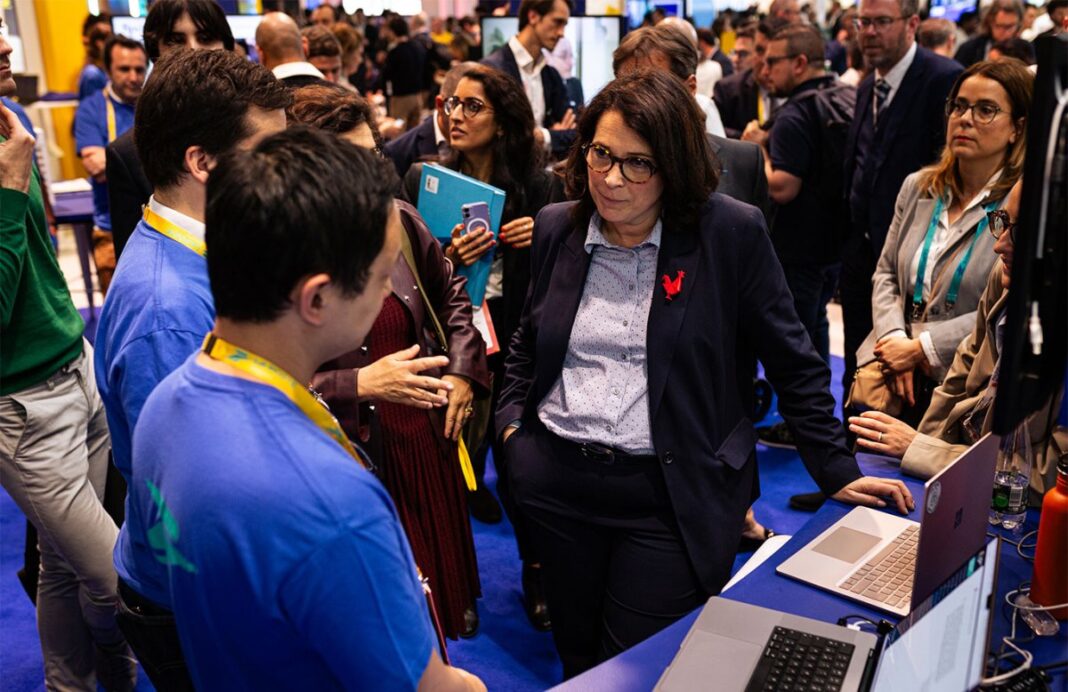There are many ways countries can go about supporting their tech industries. In France it involves picking a yearly cohort of 120 high-potential startups — the French Tech 120 — including 40 private companies deemed as most promising, dubbed the Next40.
The French Secretary of State for the Digital Economy as of this year, Marina Ferrari, revealed this year’s laureates during VivaTech week in Paris. According to its promoters, this fifth class was the most selective since the inception of the program.
The French Tech Next40/120 program was first launched in 2019, and lessons have been learned along the way, especially when some unicorns turned out to be ZIRPicorns. Following recommendations from tech insiders, criteria have changed, and half of the selection is now based on revenue metrics, rather than fundraising.
As a result, only 28 of the French Tech 120 selected in 2024 claim valuations of $1 billion or more. On the other hand, La French Tech reports that the cohort collectively had a net revenue of €10 billion in 2023, compared with €7.5 billion in 2022. Thirty-one companies reported a net revenue above €100 million.
In aggregate, this cohort reveals or confirms some interesting trends that France is riding, such as the rise of deep tech and AI. But it is also worth zooming in on new laureates of the Next40: If and when the IPO window reopens, the expectation would be for some of these to go public and reinject long-awaited liquidity into the venture capital pipeline.
Without further ado, here’s the class of 2024, summed up in one image:
That’s not the most digestible format, so let’s take a closer look at newcomers.
Welcome to the club(s)
Here are the companies that joined the Next40 list:
- AddGuests, the parent company of BungalowSpecials and Campings.com, which had joined the French Tech 120 en 2023;
- ChapsVision, a B2B company that positions itself as a specialist in sovereign data processing;
- Ekwateur, a renewable energy provider that raised a mix of venture capital and crowdfunding;
- Equativ, an adtech company formerly known as Smart AdServer that spun off Aufeminin;
- ilek, another green energy supplier;
- Malt, a freelancer marketplace active in France, Belgium, Germany, the Netherlands, Spain, and the U.K;
- Mistertemp’, an online temporary work agency;
- Mistral AI, the open LLM rocketship that is rumored to be raising money at a $6 billion valuation, three times its valuation in December;
- Pennylane, the accounting software scaleup that became a unicorn in February;
- Qair Group, one more renewable energy player;
- Weezevent, a ticketing platform created in 2008.
It is impressive, in particular, to see how fast Mistral AI joined the same list as two-decade-old Weezevent. The AI company only recently turned one, but Arthur Mensch and his co-founders are now at the helm of one of France’s most promising companies, and perhaps eventually a publicly listed one.
While that’s somewhat implied by the “Next40” moniker alluding to France’s CAC 40, it is too early to tell which of these will turn into IPO candidates and when or where. In 2023, Euronext only welcomed 64 new listings, down from 83 in 2022 and 212 in 2021.
Among the other 80 companies that complete the FrenchTech 120, new entrants are Adagio, AQEMIA, Braincube, Comet, DriiveMe, Ekimetrics, Exotrail, Flowdesk, Foodles, Greenly, HappyVore, Hoppen, iSupplier, La Fourche, Madbox, Moon Surgical, Mooncard, mylight150, Opteamis, Pasqal, PerfectStay, Planity, Shares, SiPearl, Swan, Umiami, Unseenlabs, Volta Medical, WAAT, WeMaintain and Worldia.
To our knowledge, none of these startups is a unicorn (yet). Then again, maybe that should never have been the North Star. Regardless, it would have been a tough goal to achieve in recent months: Investment into French startups declined significantly last year, from €13.49 billion in 2022 to €8.32 billion. According to EY, green tech was the largest cohort with €2.7 billion in funding, and is also well represented in the French Tech 120.
Reflecting trends
The French Tech 120 come from a variety of sectors, from fintech to space tech, but there are clear trends at play.
A caveat, though: For the first time, applicants were asked to respect commitments in terms of gender equality and ecological transition. The latter could have given a bit more weight to green tech companies, which represent 30% of the 2024 class, but that’s also roughly in line with the share of investment they attracted last year.
AI is another sector in which French startups attracted mega-rounds, even at the seed stage. There’s something going on with AI startups in France, and the French government wants to support this. The French Tech Next40/120 reflects that trend with the inclusion of Mistral AI, but also pharmatech AQEMIA and quantum computing startup Pasqal.
Beyond AI, it’s deep tech that comes up as a heavyweight on the list, accounting for 23% of the 120 companies. Again, that’s no surprise: We already reported that deep tech was on the rise in Europe, with tailwinds from public funding.
The French Tech Next40/120 program also comes with perks. There’s no direct funding involved; the main benefit is the promise of less friction and fewer “unnecessary institutional obstacles.” It is quite telling that this is touted as a largess, and presumably, more companies could benefit from that. But if you want to have global champions, you have to start somewhere.
The French Tech Next40/120 already crossed borders: 88% of companies in the new class have a physical presence or significant commercial activity abroad in 2024.
Being selected will give them more international visibility, but it’s at home that it will more directly open doors: Since 2023, an initiative called “Je Choisis la French Tech” encourages public administrations and large corporations to procure solutions from French startups. Now that markets care more about profitability, this is much more tangible than a unicorn horn.
Source link









